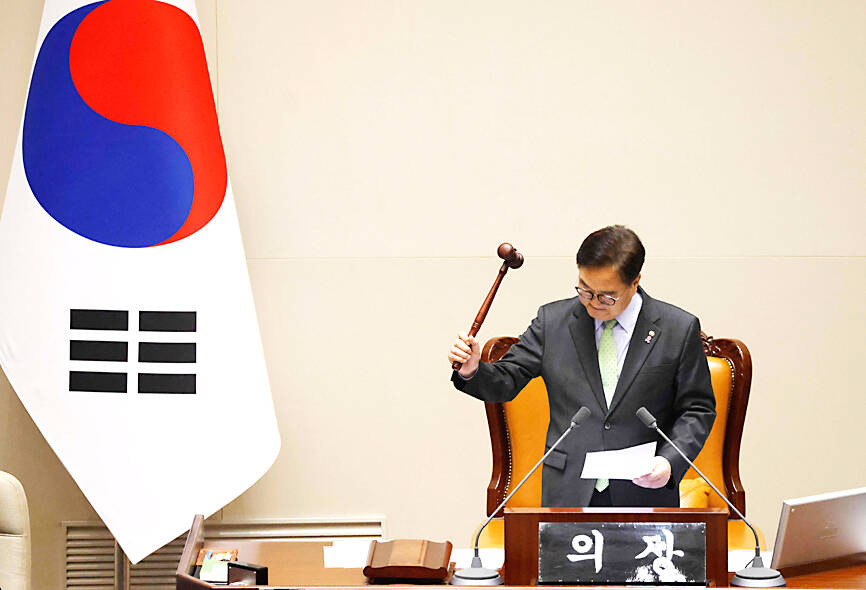South Korean President Yoon Suk-yeol escaped impeachment yesterday over his brief declaration of martial law, after lawmakers from his ruling party boycotted a vote, despite huge protests outside parliament.
Yoon stunned the nation and the international community on Tuesday night by suspending civilian rule and sending troops to the National Assembly, but was forced into a U-turn after lawmakers nixed his decree.
Opposition parties proposed the impeachment motion, which needed a two-thirds majority to pass, but a near-total boycott by Yoon’s People Power Party (PPP) doomed it to failure.

Photo: AFP
“The number of members who voted did not reach the required two-thirds majority,” National Assembly Speaker Woo Won-shik said, adding that as a result, the impeachment vote was “not valid.”
The country — and the world — was watching and it was “very regrettable that a vote could not even be held on such a significant national issue,” he added.
He said it signified “a failure to engage in the democratic process” on the part of the ruling party.
The PPP after the vote said that it blocked the impeachment to avoid “severe division and chaos,” adding that it would “resolve this crisis in a more orderly and responsible manner.”
The outcome disappointed the huge crowds — which police said numbered 150,000, while organizers said numbered 1 million — demonstrating outside parliament for Yoon’s ouster.
The opposition has already vowed to try again as soon as Wednesday, and many protesters vowed to continue demonstrations next weekend.
“I will impeach Yoon Suk-yeol, who has become the worst risk for South Korea, at any cost,” opposition leader Lee Jae-myung said.
Before the vote, Yoon, 63, apologized for the turmoil, but said he would leave it to his party to decide his fate.
“I caused anxiety and inconvenience to the public. I sincerely apologies,” he said in a televised address, his first public appearance in three days.
He said he would “entrust the party with measures to stabilize the political situation, including my term in office.”
The backing of PPP lawmakers came despite party head Han Dong-hoon — who was allegedly on an arrest list on Tuesday night — saying Yoon must go.
Only three PPP lawmakers — Ahn Cheol-soo, Kim Yea-ji and Kim Sang-wook — voted in the end.
The failure of the impeachment motion “means a more protracted political crisis,” said Vladimir Tikhonov, professor of Korean Studies at the University of Oslo.
“We will have a politically dead president — basically unable to govern any longer — and hundreds of thousands coming to the streets every week until Yoon is removed,” he added.
Had the motion passed, Yoon would have been suspended from duties pending a ruling by the South Korean Constitutional Court.
An opinion poll released on Friday put backing for Yoon at a record low of 13 percent.

The Ministry of the Interior (MOI) is to tighten rules for candidates running for public office, requiring them to declare that they do not hold a Chinese household registration or passport, and that they possess no other foreign citizenship. The requirement was set out in a draft amendment to the Enforcement Rules of the Public Officials Election and Recall Act (公職人員選舉罷免法 ) released by the ministry on Thursday. Under the proposal, candidates would need to make the declaration when submitting their registration forms, which would be published in the official election bulletin. The move follows the removal of several elected officials who were

The Republic of China (ROC) is celebrating its 114th Double Ten National Day today, featuring military parades and a variety of performances and speeches in front of the Presidential Office in Taipei. The Taiwan Taiko Association opened the celebrations with a 100-drummer performance, including young percussionists. As per tradition, an air force Mirage 2000 fighter jet flew over the Presidential Office as a part of the performance. The Honor Guards of the ROC and its marching band also heralded in a military parade. Students from Taichung's Shin Min High School then followed with a colorful performance using floral imagery to represent Taiwan's alternate name

FOUR DESIGNATED AREAS: Notices were issued for live-fire exercises in waters south and northwest of Penghu, northeast of Keelung and west of Kaohsiung, they said The military is planning three major annual exercises across the army, navy and air force this month, with the navy’s “Hai Chiang” (海強, “Sea Strong”) drills running from today through Thursday, the Ministry of National Defense said yesterday. The Hai Chiang exercise, which is to take place in waters surrounding Taiwan, would feature P-3C Orion maritime patrol aircraft and S-70C anti-submarine helicopters, the ministry said, adding that the drills aim to bolster the nation’s offshore defensive capabilities. China has intensified military and psychological pressure against Taiwan, repeatedly sending warplanes and vessels into areas near the nation’s air defense identification zone and across

COVETED PRIZE: The US president would be a peace prize laureate should he persuade Xi Jinping to abandon military aggression against Taiwan, William Lai said US President Donald Trump should get the Nobel Peace Prize should he be able to convince Chinese President Xi Jinping (習近平) to abandon the use of force against Taiwan, President William Lai (賴清德) told a conservative US radio show and podcast in an interview. The US is Taiwan’s most important international backer, despite the absence of formal ties, but since Trump took office earlier this year he has not announced any new arms sales to the nation. Trump could meet Xi at the APEC summit in South Korea on Oct. 31 and Nov. 1. Lai, speaking on The Clay Travis and Buck Sexton